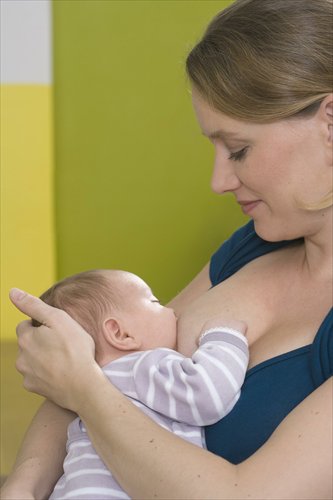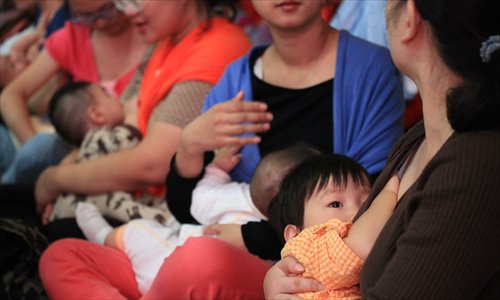Is nursing in public improper?
Expats weigh in on the heated national debate

Breasts are for feeding our offspring and there is nothing to feel embarrassed about, says one expat mom. Photo: IC
A photo of a young mother nursing her baby in a crowded subway train was posted on Sina Weibo by a passenger on November 28. It was captioned, "This is Beijing's subway, not a bus in your village." Beijing Tales, a volunteer group that collects trash on the city's subway, then used their account to forward the image with a new caption, "Do not expose your sexual organs," which triggered a heated discussion online.
Should women breastfeed in public? Is it indecent?
Most Net users defended the mother and condemned the posters for invading her privacy by sharing the photo. Both the volunteer group and the passenger who took and posted the initial photo later apologized on Sina Weibo.
Research by sina.com found that 58 percent of the polled Net users consider breastfeeding a noble act that shouldn't be judged while 36 percent chided the poster saying that even though one doesn't approve of the act, one shouldn't take and post photos of such things. The remaining 6 percent said it's indecent to breastfeed in public and mothers should take other people's feelings into consideration.
There were 277.7 million married women of childbearing age in China up to the end of 2011, according to the National Bureau of Statistics of China, and with the country allowing all couples to have a second child to boost the birthrate, the issue of breastfeeding in public is going to attract more attention.
As the debate percolates on Chinese social media, expat mothers in Beijing also shared their views with Metropolitan.

Moms nurse their children in a subway station in Shanghai during a flash mob to call for nursing facilities in public spaces in September 2012. Photo: CFP
Nursing confidently
Amy Green (pseudonym), a 39-year-old American living in Beijing, is currently breastfeeding.
"I think a woman should feel comfortable breastfeeding anywhere and at any time. No one should take a picture of another person without their permission, breastfeeding or otherwise," she said.
Green said she has breastfed in public in China, the US, and several other countries, and never had a problem.
"I have breastfed in parks and restaurants and never felt uncomfortable. I also nursed on public transportation and in other public places and didn't feel like anyone noticed or cared," she said.
Her secret lies in her confidence.
"I just decided I was not going to be shy. So far it's worked for me," Green said.
She said she tries to wear nursing shirts or layered tops that make it relatively easy to breastfeed. But other than that, she just finds a comfortable spot and focuses on the baby.
Green is never worried about what other people think since the first time she nursed in public. What worries her is the mechanics.
"I have complications from my C-section, so it is hard to nurse without a pillow to support the baby. I don't have time or energy to care what anyone else thinks," she said.
For her, a good seat with support for her back is enough.
"Of equally comfortable options, I'd pick the one with less exposure, but I won't sacrifice comfort for less exposure," she said.
"My personal philosophy is that breastfeeding is between me and my baby and no one else," she said. "I find if I act confident in my right to do what I'm doing, people leave me alone."
Expat nursing mothers in Beijing
With the family often traveling, Green said of the countries she has had nursing experiences in, Japan is the best.
"Many public spaces, such as department stores and museums, have very nice, well-maintained nursing rooms, so it is very easy to find a comfortable, private place to nurse," she said.
She thinks that Beijing is becoming more nursing-friendly with more facilities to offer. "At least in the areas that cater to expats and wealthier Chinese, such as Solana [in Chaoyang district]."
Shanna Lafontaine is another breastfeeding expat in Beijing. She is currently nursing her 14-month-old twins.
She finds Beijing very nursing-friendly. "I have found only kindness in breastfeeding outside the home," she said.
"People have given me personal space, maybe because they were uncomfortable, I'm not sure. I have never once had someone treat me badly or give me a bad look, and I've breastfed in schools, malls, hospitals, and even the airport."
For her, trying to feed twins and staying slightly modest is difficult. With two babies, she finds keeping her breasts from full view isn't always easy. "I tend to feed one at a time if I have an ayi or my husband with me as it is easier to be discreet. And this is what I'm comfortable with."
However, she said there is still much space for Beijing to improve.
"Beijing isn't the most child-friendly in general, from no place to change diapers to no high chairs in restaurants. I see them as a bigger issue versus where to breastfeed my babies," she said.
A universal debate
The debate on the appropriateness of nursing in public is not unique to China. According to Lafontaine, it is also a hot topic in the US, despite the law to protect women's right to nurse their babies.
According to the National Conference of State Legislatures, state laws protect public nursing by expressly stating that women have the right to breastfeed in public, or by specifying that the act of nursing is not indecent exposure. Only two states have placed a limitation on the act.
"I think it should be every mother's human right to breastfeed her child in public," Lafontaine said. "Expecting a mother to stay at home all day to breastfeed her baby is not fair or practical. You can't 'plan' your baby needing to eat."
Lafontaine believes breasts are meant to feed offspring, and there is nothing to be embarrassed about or uncomfortable with.
"Unfortunately, breasts have become sexualized which somehow makes a woman feeding a baby a sexualized situation which is so ridiculously far from reality," she said.
While some people think that China is a conservative society in comparison to the US and other countries, Lafontaine doesn't think traditional opinions toward exposure is the cause of the debate.
"I think that it isn't about conservatism as much as it is about not supporting and normalizing breastfeeding," she said.
"The naysayers are full of reasons: Public breastfeeding isn't OK. Bottle feed. Stay home. Go to the bathroom. Cover... My girls don't use bottles. I refuse to stay at home. I wouldn't eat in a bathroom, why should my children?"
She believes the solution lies in changing people's mind toward breastfeeding in general.
A public campaign in support of breastfeeding as a natural and normal way of feeding babies is needed, Lafontaine said.
Should one breastfeed?
"[Nursing in public] is a worldwide issue which speaks volumes about the huge need our society has to normalize breastfeeding," said Rebecca Taylor.
She is a group leader and volunteer organizer with the China branch of La Leche League (LLL), an international nonprofit organization that provides mother-to-mother help for breastfeeding.
"The biggest challenge I feel mothers of all nationalities face in Beijing is a serious lack of correct information given by healthcare professionals," Taylor pointed out. "Chinese women, in particular, are also facing family pressures and ingrained cultural beliefs that are often a barrier to breastfeeding success."
Lafontaine, who is a member of LLL, noticed that many of the Chinese members get lots of false information from the older generations in their families, such as their milk isn't enough, or baby isn't gaining enough weight, or milk after six months is just water.
"All of which is usually not accurate," she said.
China has a low nursing rate in general.
According to National Health and Family Planning Commission, the rate of urban mothers who breastfeed exclusively up to six months after they give birth is only 16 percent, much lower than the global rate of 36 percent provided by the World Health Organization in July this year.
The commission has linked the wide use and promotion of baby formula to the lower breastfeeding rate in China. In 1995, China issued regulations on formula sales, which, for example, requests that the relevant products be labeled "breast milk is recommended."
Taking action
Fortunately, changes are undergoing, especially on the more debated topic of public nursing.
In some of the cities in China, including Tianjin and Qingdao in Shandong Province, some buses have nursing seats with curtains, news portal jiemian.com reported. But the nursing bus seats in Hangzhou, Zhejiang Province, were canceled due to low use.
Beijing's "Nursing Room" project was launched in 2014, with the goal to build 1,000 such rooms for working mothers across the city in three years, the Beijing News reported. According to Beijing Municipal Commission of Urban Planning, the new city subway barrier-free infrastructure plan, which is currently polling public opinion, requests that stations with a large passenger flow set up nursing facilities.
Breastfeeding flash mobs to promote public nursing have also been happening across Shanghai, Fuzhou, Fujian Province, and other cities in China, according to a recent report by the news portal NetEase.
For mothers to breastfeed more comfortably and confidently in public space, expat mothers provide their only practical tips.
"Mothers usually feel more comfortable feeding in public when they have seen others do it. Role modeling really is the best way to begin normalizing breastfeeding in public, along with strong government promotion of breastfeeding as the biological norm," said Taylor.
Whether or not to use a cover, is also debatable. As some of the Internet comments mentioned that a cover would end the problem, mothers don't think a simple cover is the solution.
"It is very important to share the message that a woman only needs to be covered when breastfeeding if she and her baby want to cover. It is about a woman's individual comfort level, not the comfort level of those around her," said Taylor.
"Until Chinese law protects mothers from discrimination in this area, it is likely that mothers will find it challenging to stand their ground in the face of criticism," she said.